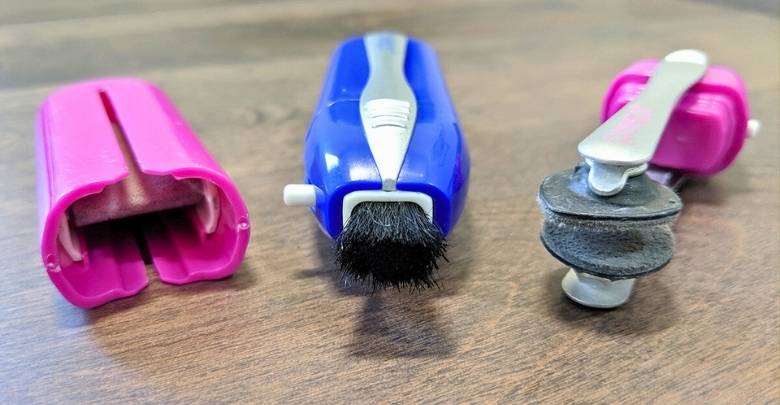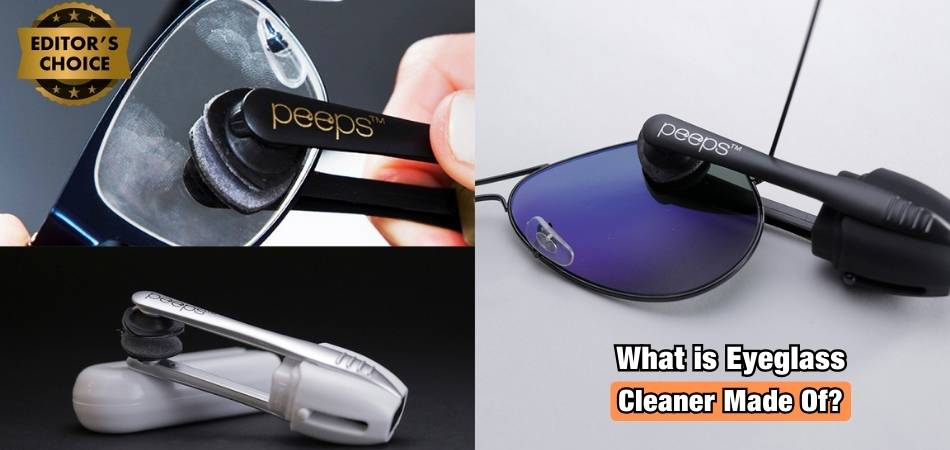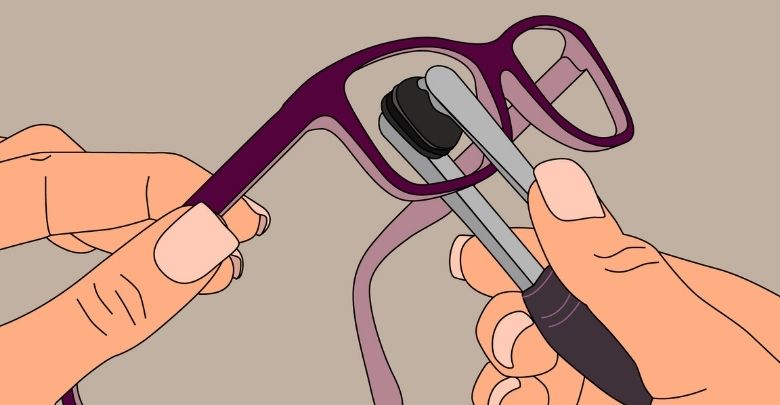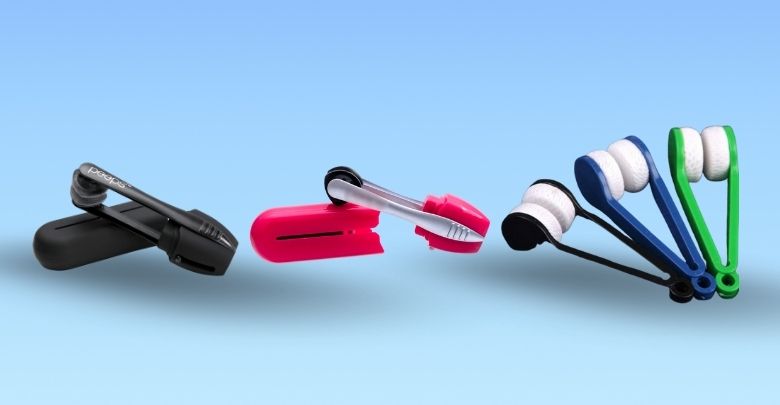Glasses can be safely cleaned with eyeglass cleaner, which removes oils, grime, and smudges. Its formula ensures lenses remain clear and free of damage. Many people might wonder, What is eyeglass cleaner made of? Let’s explore its components and importance.
An eyeglass cleaner typically contains clean water, isopropyl alcohol, and surfactants. These ingredients work together to dissolve grime and leave lenses spotless. Some formulations also include vinegar, witch hazel, or essential oils for added cleaning and antibacterial benefits. Each component is selected to be gentle on lens coatings and safe for regular use.
Curious to learn more about how these ingredients work or why they’re essential? Read on to discover everything you need to know about this topic in detail!
Why Do You Need Eyeglass Cleaner?
Keeping your glasses clean is essential for clear vision and maintaining the condition of your lenses. Dirt, fingerprints, and smudges can easily accumulate, making it difficult to see properly. Without regular cleaning, your glasses may develop scratches or other damage, reducing their lifespan and effectiveness.

Using water or common household items like tissue paper or clothes can do more harm than good. These materials might leave streaks or even scratch the surface of your lenses. A proper eyeglass cleaner ensures your lenses are cleaned safely without any unwanted damage or residue left behind.
Eyeglass cleaners are designed to remove smudges, dust, and oils while being gentle on your lenses. They help you see clearly while protecting any special coatings, such as anti-reflective or UV protection, that come with modern glasses. Regular cleaning not only improves your vision but also keeps your glasses looking like new.
For those looking for a simple and effective solution, Peeps by Carbon Klean is a great option to consider. This tool offers a safe and convenient way to clean your glasses without worrying about scratches or streaks. Its compact design makes it easy to carry, ensuring your glasses stay clean anytime, anywhere.
What is Eyeglass Cleaner Made of?
To preserve clear vision and extend the life of your lenses, you must use eyeglass cleaners. They effectively remove smudges, dirt, and oils that accumulate during daily use. Knowing their composition can help you choose or create a cleaner that suits your needs.

Water: The Primary Solvent
The majority of eyeglass cleaners use distilled water as their primary ingredient because of its gentleness and purity. It helps dissolve dirt and smudges effectively, preventing streaks caused by impurities. Clean water acts as a safe base, ensuring all other cleaning components work properly without leaving residues or damaging sensitive coatings on the lenses.
Isopropyl Alcohol: For Streak-Free Cleaning
As it evaporates quickly, isopropyl alcohol enhances the performance of eyeglass cleaners. It dissolves oils and grime, simplifying the cleaning process. When used carefully in diluted forms, it avoids harming lens coatings. Alcohol-based cleaners provide a powerful solution for stubborn marks while maintaining a streak-free, clear lens surface every time.
Surfactants: Breaking Down Oils and Grease
By lowering surface tension, surfactants—such as mild dish soap—allow oils and grease to separate from lenses. These ingredients are crucial for eliminating tough residues that water alone cannot remove. When used sparingly, they prevent soapy films while ensuring a clean, residue-free finish, suitable for regular eyeglass maintenance without any unwanted buildup.
Vinegar: A Natural Cleaning Agent
White vinegar offers an eco-friendly option with mild acidity to dissolve stubborn grime and smudges. Its antibacterial properties also make it an effective alternative. Proper dilution ensures safety for most lenses while improving cleaning efficiency. Vinegar-based solutions are especially popular among those seeking natural, homemade cleaning options for sensitive eyewear.
Witch Hazel: A Gentle Alternative
It is a plant-based ingredient known for its gentleness and astringent properties. Mixed with water and a tiny amount of soap, it creates an effective cleaner for delicate lenses. Unlike harsher alcohol-based solutions, witch hazel provides similar cleaning benefits while remaining soft on coatings, keeping lenses clear and safe.
Essential Oils: Adding Fragrance and Antibacterial Properties
Tea tree and lavender are two examples of essential oils that give cleaners their pleasant scents and antibacterial properties. Only a few drops are needed, as excessive amounts can leave smudges. They complement other ingredients by improving the solution’s overall effectiveness while offering a naturally fresh, fragrant finish, perfect for everyday lens care.
Commercial Cleaners: Proprietary Blends
The ingredients in commercial eyeglass cleaners are blended into optimized formulas that are designed to be both safe and effective. These products may include anti-fog agents or additional components to protect lenses. Always read labels carefully to ensure compatibility with your eyewear. Commercial options often simplify cleaning routines by providing an all-in-one, convenient, and reliable cleaning solution.
Eyeglass cleaners rely on a balanced mix of components to keep your lenses spotless and protected. Choosing or crafting the right cleaner helps maintain clear vision and extend the life of your glasses. By knowing each ingredient, you can ensure that your eyewear remains clean and safe with minimal effort.
How Do These Ingredients Work to Clean Lenses?
By efficiently eliminating smudges, dirt, and oils, eyeglass cleaners make it simple to maintain clear vision. These solutions balance gentle and effective ingredients to protect lenses. By understanding how these components work, you can ensure better lens care. Here’s how they work to deliver streak-free, clean glasses.

Dissolving Oils and Dirt
Oils and dirt accumulate on lenses daily, creating a film that obstructs vision. Cleaners use solvents like alcohol or water to break these down, making removal effortless. Gentle surfactants loosen stubborn residues, ensuring that even greasy marks lift off easily during wiping. This combined action ensures glasses remain clear and spotless.
Reducing Surface Tension
Surfactants in eyeglass cleaners lower the surface tension between grime and the lens. This mechanism enables dirt and oils to detach, simplifying cleaning. These compounds are particularly effective against smudges and fingerprints, as they allow easy lifting without excessive rubbing, which could harm the lens coatings or materials.
Evaporating Without Residue
The quick-drying nature of certain cleaner ingredients, like isopropyl alcohol, ensures lenses dry without streaks or marks. This characteristic prevents residues from building up and keeps surfaces crystal clear. Proper evaporation also reduces the need for additional polishing, making the cleaning process efficient and hassle-free for regular lens care.
Enhancing Antibacterial Protection
Some eyeglass cleaners incorporate antibacterial agents to remove invisible bacteria along with visible grime. This feature is particularly important for hygiene, as bacteria can transfer from lenses to hands or face. Antibacterial components ensure that cleaning provides not only visual clarity but also a healthier and safer experience for users.
Protecting Lens Coatings
Carefully formulated solutions prioritize lens coatings, safeguarding them from damage during cleaning. Ingredients are chosen to avoid harshness, ensuring coatings remain intact while still removing dirt. This balance protects anti-reflective, anti-scratch, or UV-blocking layers, extending the functional lifespan of your glasses while keeping them visually appealing.
Eyeglass cleaners combine science and practicality to keep your lenses clear, safe, and hygienic. Regular cleaning ensures you enjoy sharp vision and extends the life of your glasses. By using products designed to respect lens coatings, you protect your eyewear while enjoying effortless maintenance every day.
How to Properly Use Eyeglass Cleaner for Best Results?
Maintaining both the general health of your lenses and clear vision requires routine cleaning of your eyeglasses. The right techniques and products can help you avoid scratches, streaks, or smudges. Below, we will discuss the best ways to clean your glasses for optimal results.
Using a Microfiber Cloth
A microfiber cloth is essential when cleaning your eyeglasses. It’s designed to trap dust, dirt, and oil without leaving any lint behind. Gently wipe the lenses in a circular motion, starting from the center and working outwards, to remove smudges and debris without scratching the surface.
Use an Approved Eyeglass Cleaner
The lenses must be cleaned with a cleaner specifically designed for eyeglasses to prevent damage. Spray the cleaner lightly on both sides of your glasses and gently wipe with the microfiber cloth. This ensures that dirt and oils are removed, and your glasses stay in great condition.
Avoid Household Products Like Tissues or Paper Towels
Although they might seem like a quick fix, household items like paper towels or tissues can scratch your lenses. These materials often have fibers or dust particles that can cause damage. Instead, always opt for a microfiber cloth and a proper eyeglass cleaner for the best results.
Be Careful with DIY Cleaning Methods
Sometimes, people use homemade solutions to clean their glasses, like rubbing alcohol as eyeglass cleaner. While this can work for difficult marks, reduce the alcohol to avoid damage. Always check if the solution is safe for your specific lenses before use to ensure it doesn’t damage any layers.
Regular Maintenance for Long-Term Protection
Maintaining the look and functionality of your eyeglasses requires routine cleaning. Avoid letting dirt or oils build up for long periods. Regularly use the appropriate cleaning solutions, and keep your glasses in a case when not in use to protect them from scratches.
Proper eyeglass cleaning ensures clear vision and helps extend the life of your lenses. By following these simple steps, you can maintain their condition and enjoy better visual comfort for longer periods.
Tips for Choosing the Best Eyeglass Cleaner
Selecting the appropriate eyeglass cleaner guarantees sharp vision and shields your lenses from needless harm. With so many options available, understanding the key features of a good cleaner helps you make an informed decision. Below, you’ll find helpful tips for selecting the best cleaner.

Look for Ingredients That Protect Lens Coatings
Safe, non-toxic ingredients are needed for lens coatings, such as anti-reflective and UV protection layers. Cleaners should avoid harsh chemicals that could wear down these coatings. Considering trusted options will help ensure the safety of your glasses while keeping them clean and functional for long-term use.
Choose Cleaners with Gentle Surfactants
Effective cleaning relies on surfactants to break down oils, dirt, and fingerprints from lenses. These compounds clean thoroughly while being gentle on delicate surfaces. Ensure that the product you select prioritizes removing grime without leaving a soapy film or risking any scratches.
Opt for Solutions That Dry Streak-Free
A good eyeglass cleaner should leave lenses spotless, without streaks or smudges after cleaning. Look for products that contain ingredients like isopropyl alcohol, which evaporates quickly. This feature minimizes residue and eliminates the need for additional wiping, leaving your glasses clean and clear in less time.
Avoid Abrasive Materials or Tools
Proper cleaning also depends on using the right tools alongside the cleaner. Always pair your solution with microfiber cloths, as they’re soft and effective. Abrasive materials or rough cloth can scratch lenses and reduce their clarity, so investing in quality tools is essential for better results.
Consider Trusted Brands or DIY Options
When selecting an eyeglass cleaner, both reputable brands and homemade solutions can work well. Checking reviews for best products for cleaning glasses can guide you toward reliable options. Make sure to evaluate whether the solution aligns with your specific lens type and personal preferences.
The right eyeglass cleaner ensures both effective cleaning and lens protection for long-lasting clarity. By focusing on the ingredients, application, and tools, you can maintain your glasses in excellent condition. Regular care leads to clearer vision and extended lens life.
FAQs About What is Eyeglass Cleaner Made of?
Eyeglass cleaners are essential for maintaining clear vision and extending the lifespan of your glasses. Below, we answer some common questions about what goes into eyeglass cleaners, providing insights that you may not have encountered in previous discussions.
Are Eyeglass Cleaners Safe For All Lens Types?
Most eyeglass cleaners are designed to be safe for standard lenses, but some coatings require special care. Always check the label or consult your optician to ensure compatibility with anti-reflective, blue-light-blocking, or polarized coatings to avoid potential damage.
Can You Use Eyeglass Cleaner On Sunglasses?
Eyeglass cleaners can typically be used on sunglasses, but ensure they do not harm UV or polarization layers. Using a cleaner specifically designed for sunglasses or checking for compatibility will keep these features intact and maintain optimal lens performance.
Do Eyeglass Cleaners Contain Harmful Chemicals?
Reputable eyeglass cleaners are formulated with safe ingredients, but some may contain chemicals unsuitable for sensitive individuals. If you have concerns about strong scents or chemicals, opt for natural or hypoallergenic alternatives that provide effective cleaning without irritating.
How Often Should You Use Eyeglass Cleaner?
Using eyeglass cleaner daily or as needed ensures clear vision and prevents dirt buildup. Regular cleaning keeps lenses smudge-free and maintains their quality, but avoids overcleaning, as excessive wiping can wear down coatings over time.
Can Eyeglass Cleaners Be Used On Smart Glasses?
Smart glasses often include sensitive components like screens or sensors that require gentle care. Check the manufacturer’s instructions for cleaning guidance and use cleaners specifically formulated for electronics to avoid damaging the device.
What Should You Avoid Mixing In Homemade Cleaners?
Avoid mixing strong acids, ammonia, or undiluted alcohol in homemade eyeglass cleaners, as these can damage lenses or coatings. Stick to gentle, proven ingredients like distilled water, mild soap, or diluted witch hazel to ensure effective and safe cleaning for your glasses.
End Note
Keeping your eyeglasses clean is not just about aesthetics—it’s essential for maintaining clear vision and protecting your lenses. Choosing the right cleaner and understanding how to use it properly ensures your glasses remain in top condition for years to come.
If you ever wondered, What is eyeglass cleaner made of? the answer lies in its blend of distilled water, isopropyl alcohol, surfactants, and sometimes natural additives like vinegar or witch hazel. These ingredients work together to remove smudges, oils, and dirt while preserving delicate lens coatings and ensuring streak-free clarity.
To care for your glasses, always use a microfiber cloth, avoid harsh chemicals, and store your eyewear in a protective case when not in use. Best wishes for clear vision and long-lasting, spotless glasses!






